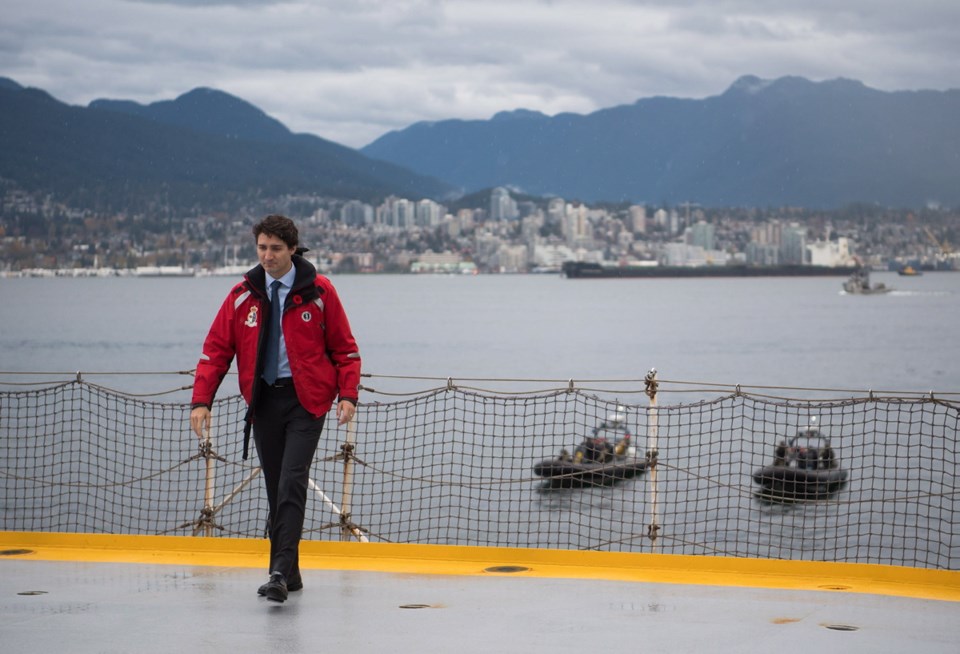 It’s conceivable the federal government’s marine-response upgrade announced this week is just designed to handle current traffic and address the age-old complaints about how underserved B.C. is.
It’s conceivable the federal government’s marine-response upgrade announced this week is just designed to handle current traffic and address the age-old complaints about how underserved B.C. is.
But not many people are successfully resisting the conclusion it’s more than that. It looks as if the ocean-protection plan sets the stage for the upcoming call on approving Kinder Morgan’s pipeline-expansion plan, which would involve a big jump in the number of oil tankers on the south coast.
Most of the ocean-protection-plan spending over the next five years is slated for the B.C. coast. Part of it will be a direct investment in “oil spill cleanup research … to ensure that decisions taken in emergencies are evidence-based.”
The pipeline decision is due by Dec. 19. Marine safety is one of the key concerns of the many people who oppose the line. So a big marine-safety push weeks before the pipeline decision suggests Ottawa is trying to clear the decks for a yes. An upcoming moratorium on north-coast tanker traffic furthers the impression. That would put an end to the planned Northern Gateway pipeline to Kitimat, which only intensifies the need for the Trans-Mountain line to Burnaby.
Prime Minister Justin Trudeau is dealing with deep-seated misgivings in B.C. at the same time he’s facing demands from Alberta and elsewhere to address the national imperative of getting more Alberta oil to the coast, where its value is increased. There is an enormous pile of money to be made, and no one needs a cash fix more than Alberta.
The political accounting was outlined by one politician privately as follows: Trudeau can’t approve a pipeline through hostile Quebec, because there are too many seats at stake. And he wants a national carbon tax, which needs Alberta buy-in. So the Trans-Mountain approval is the card to play. The bet is that Trudeau will win more support in Alberta than he will lose in B.C.
He tried to straddle the divide in his Vancouver announcement. “As a government, everything we do, and every action we take, is done with one goal in mind: We want to leave our kids and grandkids with a better place to live — whether we’re creating good, well-paying jobs for the middle class, ensuring our communities are safe and protected, or taking the necessary action to safeguard our environment.”
B.C. coastal residents might live in an oily bubble of prosperity like almost everyone else, but convincing them to make the allowances for it to continue in other parts of the country is going to take all the charm he has, and more.
His ocean plan calls for $1.5 billion to be spent on an undetermined basis on the Pacific, Atlantic and Arctic coasts, with the West Coast slated to get most of the new resources. The Pacific plans include increasing the towing capacity of existing coast guard vessels to enable rescue of larger ships, four new lifeboat stations to improve response times and a new environmental-response depot in Port Hardy, along with other upgrades.
The pipeline project has been under federal review for three years, but even if the federal Liberals approve it, it still has a long way to go.
A B.C. Supreme Court ruling last January negated part of the federal-provincial arrangement to avoid overlapping reviews. It held that B.C. needs to do its own review with an emphasis on First Nations consultation with the 56 bands along the route.
Apart from that official review, the B.C. government will eventually have to make a political decision on whether it meets the five conditions it set several years ago for pipeline approval. “World-leading” marine spill response is one; a similar regime on land is another. “Successful completion of environmental reviews” could be assumed by that point, since it already passed the federal review. That leaves the two more major points.
First Nations participation in benefits must be assured, along with meeting treaty requirements.
And a “fair share” of the benefits must go to B.C. for the risk incurred.
It adds up to an expensive toll that has to be paid before any pipe gets laid west of the Rockies.



